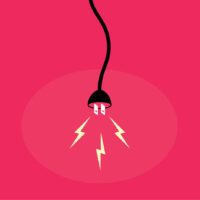LED lamp
An LED lamp is a light-emitting diode (LED) product that is assembled into a lamp (or light bulb) for use in lighting fixtures. LED lamps have a lifespan and electrical efficiency that is several times better than incandescent lamps, and significantly better than most fluorescent lamps, with some chips able to emit more than 100 lumens per watt. The LED lamp market is projected to grow by more than twelve-fold over the next decade, from $2 billion in the beginning of 2014 to $25 billion in 2023, a compound annual growth rate (CAGR) of 25%.
Like incandescent lamps and unlike most fluorescent lamps (e.g. tubes and compact fluorescent lamps or CFLs), LEDs come to full brightness without need for a warm-up time; the life of fluorescent lighting is also reduced by frequent switching on and off.[citation needed] Initial cost of LED is usually higher. Degradation of LED dye and packaging materials reduces light output to some extent over time.
Some LED lamps
are made to be a directly compatible drop-in replacement for incandescent or fluorescent lamps. An LED lamp packaging may show the lumen output, power consumption in watts, color temperature in kelvins or description (e.g. “warm white”), operating temperature range, and sometimes the equivalent wattage of an incandescent lamp of similar luminous output.
“The space shuttle was often used as an example of why you shouldn’t even attempt to make something reusable. But one failed experiment does not invalidate the greater goal. If that was the case, we’d never have had the light bulb.”Elon Musk
- A WordPress Commenter on Hello world!
- Hello world! March 5, 2019
- Flash July 24, 2015
- Painting July 24, 2015
- Mont Blanc, the only one July 24, 2015
- Job of your life July 24, 2015





